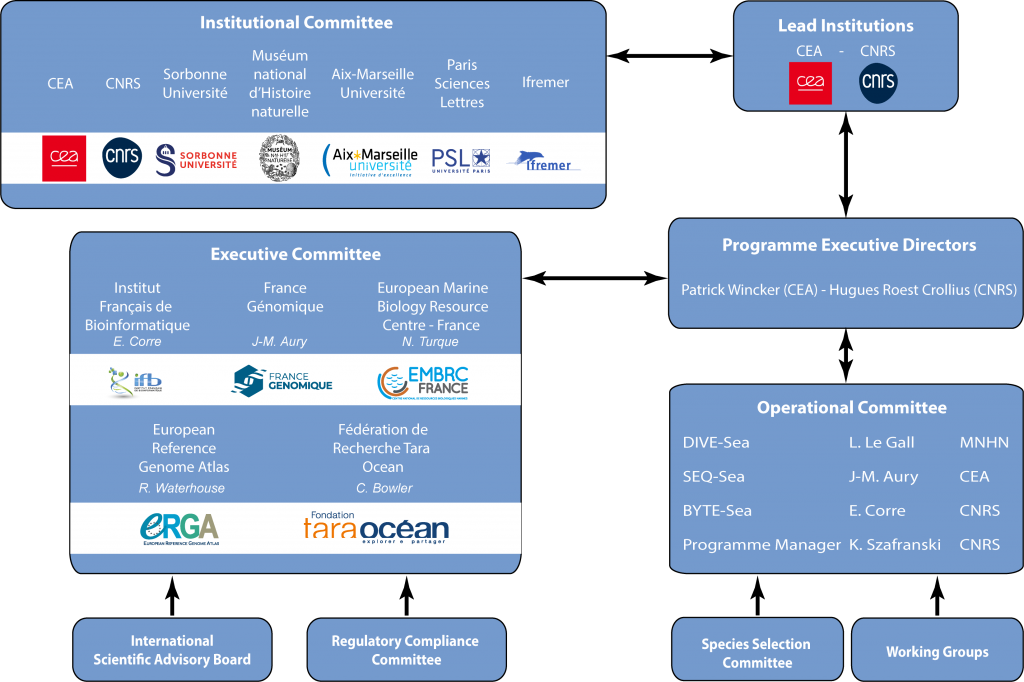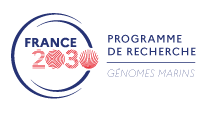ATLASea Regulatory Compliance, Ethics & Best Practice Statement
Context
Recent advances in sequencing technologies have dramatically reduced the time, cost and effort required to sequence entire genomes. With such powerful tools, an international initiative, the Earth BioGenome Project (EBP), has been launched, with the ambitious aim of sequencing genomes from all life forms. ATLASea represents a direct national contribution to the EBP, specifically targeting international leadership on acquiring genome sequences from marine organisms. ATLASea will cover a wide range of marine species in all eukaryotic groups, from mammals to microscopic forms. In close coordination with European partners through the European Reference Genome Atlas (ERGA), ATLASea will characterize thousands of genomes and millions of genes from marine life. Because genes and genomes govern all biological functions, all areas of fundamental and applied research in biology and associated disciplines will be impacted in the coming decades by this new and massive trove of information.
ATLASea is an Open Access programme that will influence a range of scientific fields through the availability of high-quality reference genomes to the national and international research community. ATLASea will deliver complete and high-quality gene catalogues of most keystone and sentinel species present in the French Exclusive Economic Zone (EEZ). It will contribute to the integration of realistic, fine-scale biological data to bridge a critical gap in Earth system and climate modelling. ATLASea will provide the framework for significantly enhancing interactions between academic researchers and industry and thus stimulating innovative developments towards blue bioeconomy. Marine biotechnology, driven by increasing consumer demand for natural products and biofuels and by development of new medical treatments, biomaterials, fertilizers and plant biostimulants, has an important role to play in addressing public priorities such as carbon neutrality or innovative, healthy and sustainable food systems.
The key to unlocking the full potential of the unique diversity of marine organisms lies in accessing their genomic information. However, accessing and utilizing marine organisms in the context of scientific research is framed by laws, conventions and ethical regulations that require the vigilance, awareness and commitment of all partners.
As a high-profile scientific programme that aims to access the genomic material of living organisms, some of which may be protected species or be sourced from protected areas, with potential applications in a very broad range of fundamental and applied contexts with major societal relevance, the ATLASea programme must be beyond reproach and proactive about legal, ethical and societal issues related to its activities. Moreover, the ATLASea consortium aims to promote a science that is aware of both its roles and responsibilities. High standards of legal and ethical compliance are essential to protecting activities and data along the course of the ATLASea programme and beyond.
ATLASea Regulatory Compliance Committee
The ATLASea programme has a clearly defined governance structure (Figure 1). This Regulatory Compliance, Ethics & Best Practice Statement has been validated by all Executive Committee partners of ATLASea. The working group that elaborated this Statement will continue its work for the duration of the programme as the « ATLASea Regulatory Compliance Committee » (ARCC). This committee will convene at least once every year throughout the duration of the programme and as often as necessary. Its role will consist of:
- assessing compliance within the programme to the guidelines detailed in this Statement,
- reporting to the Executive Committee,
- obtaining feedback from programme partners on any issues encountered with complying with these guidelines,
- suggesting corrective actions, and
- monitoring the evolution of the relevant legal framework and scientific best practice.

Regulatory Compliance, Ethics & Best Practice statement
By submitting a sample for sequencing and its metadata as part of the ATLASea programme, a researcher becomes de facto a partner of the ATLASea programme. Each partner agrees that they comply with the requirements of this Statement.
ATLASea programme partners are responsible for:
- complying with all applicable laws, licences, permissions, permits, and regulations (both domestic and international in scope) relating to the acquisition, transfer, storage, use, destruction, and disposal (where relevant) of the samples or specimens they collect, and
- for providing documentary evidence of this compliance on request to the ATLASea Regulatory Compliance Committee.
For all of these activities, ATLASea partners must implement ATLASea Standard Operating Procedures (SOPs), which should include details of regulatory and ethical requirements. The standards within this document must be maintained during transfer of samples or specimens from/to ATLASea team partners and any other collaborators. In particular we note the following:
- Provenance metadata
All samples collected and/or supplied must have sufficient data describing their provenance. The sample provider is responsible for providing correct metadata information.
- Compliance with Access and Benefit Sharing regulations
In accordance with the EU Access and Benefit Sharing (ABS) Regulation (Regulation 511/2014) issuing from the Nagoya Protocol of the Convention for Biological Diversity, compliance must be ensured with any existing national legislation in the country of origin of any biological resource used within ATLASea, including obtaining Prior Informed Consent (PIC) and Mutually Agreed Terms (MAT) prior to accessing samples, if applicable. The MNHN coordinates ABS compliance within ATLASea.
- Protected species and areas
Compliance with specific regulations relating to protected species and/or areas (including Marine Protected Areas, national and regional parks or reserves, restricted fishing areas, etc.) must be ensured by any ATLASea partner in charge of providing samples.
- Environmental impact
Samples and specimens must be acquired with the minimum possible impact on biodiversity, the local habitat and the wider environment, even when there is no applicable legal regulation or permit/licence requirement relating to a species or to a particular habitat.
- Utilization of animals for scientific purposes
All samples or specimens (including vertebrates and invertebrates) used in ATLASea must be collected, maintained and supplied in full accordance with the regulations to capture and kill animals, all current legal requirements and institutional and scientific community best practice guidelines. Any ATLASea partner performing activities that may fall within the scope of regulations pertaining to use of animals for scientific purposes (applicable to vertebrates and cephalopods) must refer to their relevant local ethics committee prior to performing the activity.
- Transfer of specimens and samples
ATLASea partners receiving specimens and/or data shall not transfer, store or use them except in strict accordance with the terms and conditions defined in the relevant legal and regulatory documentation, including any Material Transfer Agreement agreed upon with the provider, any existing ABS MAT, the Convention on International Trade of Endangered Species (CITES), or any other permits or licences relating to the original sourcing of the specimens.
- Samples sourced from non-ATLASea partners
ATLASea partners that source samples from individuals or organizations that are not a member of the consortium are responsible for ensuring that samples have been collected in full compliance with all applicable regulatory requirements and with all policies, best practices and standard operating procedures of ATLASea.ATLASea partners that source samples from individuals or organizations that are not a member of the consortium are responsible for ensuring that samples have been collected in full compliance with all applicable regulatory requirements and with all policies, best practices and standard operating procedures of ATLASea.
Communication of the ATLASea Regulatory Compliance, Ethics & Best Practice statement
ATLASea partners should provide a copy of this Statement to all internal staff involved in the programme, as well as to collaborators and partners to ensure that it is clear that compliance to the Statement is expected.
Additional consideration
List of other considerations which may apply to sample/specimen collection and treatment:
● Requirement for landowner permission and compliance with property law, including for the collection of non-protected species outside protected areas.
● The relevance of current laws and licences which may have changed since sample or specimen acquisition.
● Information contained within legislative instruments, permits and licences may be permissive of or prohibit activities.
● Compliance with United Nations Convention for the Law of the Sea (UNCLOS) regulations and the evolving Biodiversity Beyond National Jurisdiction (BBNJ) agreement.
*This Statement is based on guidelines established within the European Reference Genome Atlas (ERGA) and Darwin Tree of Life (DToL) projects. The ATLASea consortium thanks ERGA and DToL for sharing their documents, which have been adapted here to meet the needs of ATLASea. All guidelines detailed in this document only apply to ATLASea and not to ERGA or DToL.
Resources and external links
National Regulations
LOI n° 2016-1087 du 8 août 2016 pour la reconquête de la biodiversité, de la nature et des paysages
https://www.legifrance.gouv.fr/jorf/id/JORFTEXT000033016237
Code rural et de la pêche maritime Livre II, Titre Ier, Chapitre IV, section 6, Utilisation d’animaux vivants à des fins scientifiques
https://www.legifrance.gouv.fr/codes/section_lc/LEGITEXT000006071367/LEGISCTA000027039288/
Arrêté du 1er février 2013 fixant les conditions d’agrément, d’aménagement et de fonctionnement des établissements utilisateurs, éleveurs ou fournisseurs d’animaux utilisés à des fins scientifiques et leurs contrôles, Annexe IV
https://www.legifrance.gouv.fr/loda/id/JORFTEXT000027037983/
International regulations
Convention on International Trade in Endangered Species (CITES)
https://cites.org/sites/default/files/eng/disc/CITES-Convention-EN.pdf
Convention on Biological Diversity
https://www.cbd.int/doc/legal/cbd-en.pdf
Nagoya protocol on access to genetic resources and the fair and equitable sharing of benefits arising from their utilization to the convention on biological diversity
https://www.cbd.int/abs/doc/protocol/nagoya-protocol-en.pdf
COUNCIL DIRECTIVE 92 /43 /EEC of 21 May 1992 on the conservation of natural habitats and of wild fauna and flora
https://eur-lex.europa.eu/legal-content/EN/TXT/PDF/?uri=CELEX:31992L0043

